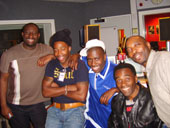 |
 |
 |
 |
|
The Walter Tull Sport, Music and Arts Development Association is a young community social enterprise group founded in June 2006. The group takes its name from Mr. Walter Tull, the first ever black officer in the British Army and the second black footballer to play professional football in Britain. He played for Tottenham until 1910 when he was transferred for a large fee to Northampton Town. The army soon recognized Tull’s leadership qualities and he was quickly promoted to the rank of sergeant. Tull had impressed his senior officers and was recommended that he should be considered for further promotion. He was a strong black figure who rose above the racial barriers of his time to succeed in his own right.
We spoke to Beresford Lee and Tennis Russell of the Walter Tull Association to find out more. |
|||
We recognised that in the South West that there is a lack of teachers to deal with Black & Minority Ethnic (BME) issues and a lack of Equality mentors. As group of similar like-minded group of BME and Asian individuals we got together to rectify this. In particular, there are not enough black tutors to represent the community.
The Walter Tull Sport, Music and Arts Development Association uses the ‘SMART Principle’ (Sport Music and the Arts) to engage, empower and educate primarily young people regardless of their ability, background or culture - providing tools for lifelong learning and living. Amongst other things we aim to develop primarily Black and Asian mentors and role models; explore Black and Asian History and achievement over last 1000; raise the profile of gifted and talented young people; and develop The Walter Tull Training Centre.
With the assistance of Abolition 200, we are launching the The Walter Tull HIPE (Health, Integration, Participation & Education) Project. We will be running 64 workshops over the year using sport, music and the arts to engage, educate and empower disaffected and disadvantaged young people. A third of these workshops will concentrate on music, dance, poetry, cultural influences and the spoken word. We will also be setting up young achievers recognition awards and a mentoring programme.
Throughout the development process the young people will be encouraged to present their work and achievements through radio programmes, workshops and showcases. Through educational partnerships we will encourage development with qualification as a key outcome.
To kick of the ceremonies for Abolition 200, we held an African Fusion Dance event at the Commonwealth Museum in February. The event celebrated the positive outcomes of African cultures and involved music, dance and poetry.
It was great to see that the powers that be had recognised the work we are doing within the community and for me it stated that our organisation are moving in the right direction with regards to our aims.
My image of Downing Street was soon blown away once I entered this amazingly large grand building. In a nutshell, the building reminded me of a Mansion House with many function rooms, pictures and memoirs of English history. The reception event was filled with many well-known ministers and officials whom all mingled and networked together. Also at this event were other groups and organisation throughout England who were involved in projects relating to the Abolition of the Slave Trade.
It was a memorable event, which I believe will be the beginning of many great events for the Walter Tull Sports and Arts Development Association
The biggest challenge is securing funding. Also to get organisations to buy into our concept. We would love to make the project sustainable and we would like a 4-5 year sustainable project to work with schools.
We are currently supported by Awards for All, Abolition 200 (Bristol City Council) and Quartet. We have incoming support from 100 % Focus.
We would develop the Walter Tull Training Centre and find the best mentors within the UK to work with us.
David helped to get us focused by setting guidelines and has given us information and documents that has been invaluable to our organisation. He helped kick start the project. The Performance Improvement work has really helped us.
We have also formed partnerships with major organisations like CEED, Tribe of Doris and World Jungle that are part of the C3 Project and we have found these partnerships very accommodating.
More info at www.waltertull.com